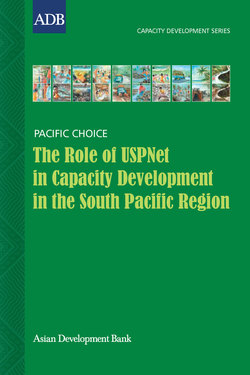Читать книгу The Role of USPNet in Capacity Development in the South Pacific Region - Ronald Duncan - Страница 5
На сайте Литреса книга снята с продажи.
PROLOGUE
ОглавлениеUpoko Tupa, an ambitious young Pacific Islands manager, was reflecting on his recent promotion to a challenging senior management position as the chief executive officer (CEO) of a government business enterprise on the remote island of Rarotonga, a popular South Pacific holiday destination in the Cook Islands. Upoko is a science graduate from the University of the South Pacific (USP) with 10 years of work experience. His promotion from a technical operations manager to a CEO position demanded new competencies in strategic planning, finance, accounting, marketing, and human resource management.
Sitting out on the ocean front deck with a group of his friends, Upoko commented: “My new job is great but I need training in management techniques. What I really need is an MBA, but I can’t take time off to go to USP in Suva to take the course.” His friend Tevai, a budding entrepreneur who had just returned from a business trip to Samoa, said: “Last Saturday I met some guys in Samoa who were celebrating the completion of the MBA course that they had taken part-time at the USP Alafua campus there. They said the course made a big difference to their performance as managers and some have already taken up new CEO positions with big salary increases. I hear that the World Bank is helping upgrade the USP satellite communications system so that we will have access to state-of-the-art distance learning.” Upoko replied: “I know a dozen people who are keen to do an MBA here in Raro. Why don’t we lobby to get USP to deliver the course here, using all the new satellite technology and their new audiovisual studio?”
Rod Dixon, the USP campus director, was one step ahead of him. At the USP council meeting held in May 2006 in the Cook Islands, he had lobbied the dean of the Faculty of Business and Economics to replicate the Samoa MBA program delivery system in Cook Islands and make full use of USPNet and a World Bank-sponsored project that will considerably improve the speed and quality of video-conferencing and internet communication among the 12 campuses that make up this regional university.
The 2006 upgrade of USPNet is already making it feasible to deliver the MBA more effectively in more Pacific island countries. Over the last 10 years, MBA enrolments have grown rapidly, but up until 2005 the course was only conducted in the Fiji Islands—in Suva and Nadi. In 2005, with financial support from the European Union, the MBA program began delivering the course on a face-to-face basis to 30 managers in Samoa, and in February 2007 a cohort of 35 executives started the 2-year program in the Cook Islands (again on a face-to-face basis) with financial support from the Government. Planning and feasibility studies are now being undertaken on delivering the MBA course in Tonga, Kiribati, Vanuatu, and other member countries, depending on demand, cohort size, and financial support from donors. The recent USPNet upgrade will enhance the network’s capacity, allowing faster internet speed and better audio and video quality, and thereby making blended-mode delivery of the MBA more effective.
